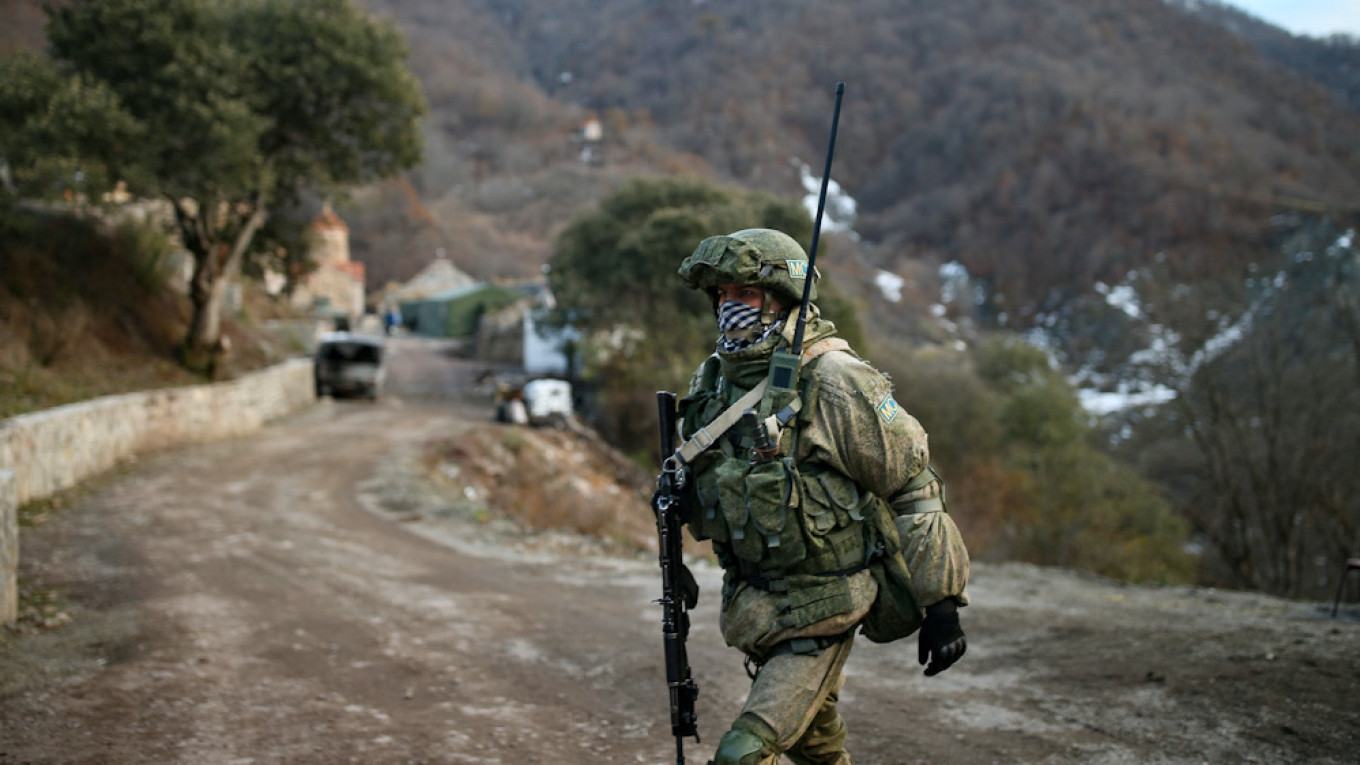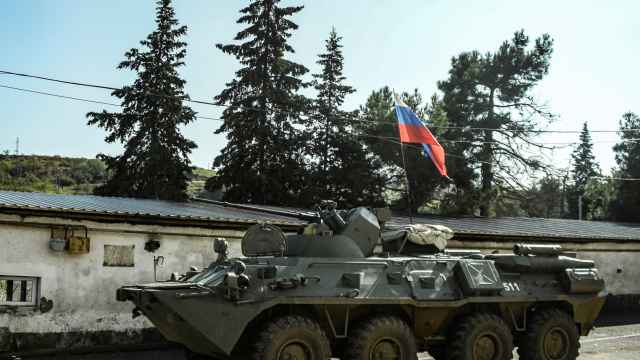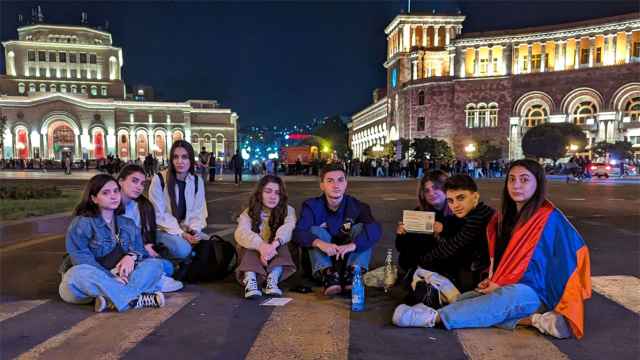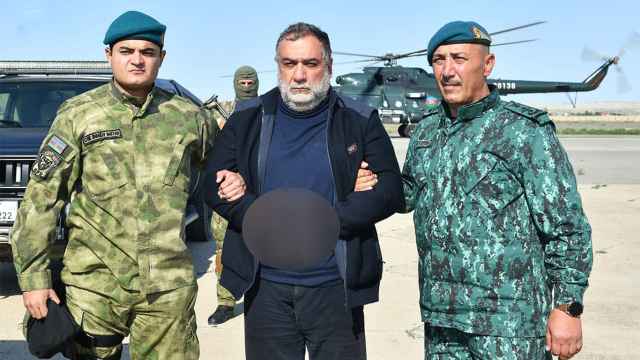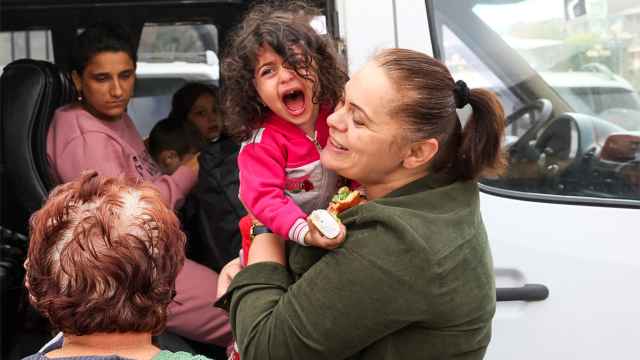Armenia and Azerbaijan on Tuesday reached a Russia-brokered ceasefire, ending hostilities that erupted earlier in the day along their border, the defense ministry in Yerevan said.
The clashes that Armenia said left one of its soldiers dead and a dozen others captured sparked fears of another flare-up a year after the Caucasus arch-foes fought a war over the disputed mountainous region of Nagorno-Karabakh.
The six-week conflict, which left more than 6,500 dead, ended a year ago in November in a Russia-brokered deal that saw Armenia cede swathes of territory it had controlled for decades.
"Under the mediation of the Russian side, an agreement was reached to cease fire at Armenia's eastern border from 18:30 (1430 GMT). The situation has relatively stabilized," the Armenian defense ministry said in a statement on Tuesday.
The ministry said at least one of its soldier died in the clashes and that Armenia had "lost control of two military positions."
It also reported that 12 Armenian servicemen were captured by the Azerbaijani military.
The two sides accused each other of initiating fighting along their shared border.
"Armenian troops attacked Azerbaijani positions in the districts of Kelbajar and Lachin," Azerbaijan's defense ministry said in a statement, adding that two Azerbaijani troops were wounded.
The ministry said Azerbaijani troops "stopped the enemy's advance, surrounded and detained Armenian servicemen."
Armenia's defense ministry said Azerbaijani forces tried to "break through" the border before being repelled.
In a security council meeting, Pashinyan accused Azerbaijan of "an aggression on Armenia's sovereign territory."
"Azerbaijan and the forces that support it are targeting Armenia's statehood, sovereignty, and independence," he said, alluding to Turkey, which has backed Baku during the Karabakh war.
Appeals to Moscow
Armenia appealed to ally Russia for military support under the Collective Security Treaty Organization pact, which obliges Moscow to protect it in the event of a foreign invasion.
"Given that there was an attack on Armenia's sovereign territory, we appeal to the Russian Federation to protect Armenia's territorial integrity," said Security Council Secretary Armen Grigoryan.
President Vladimir Putin discussed the situation with Pashinyan by phone — the Kremlin said in a statement — and agreed to "continue contacts" on the matter.
Russia's Defense Minister Sergei Shoigu held phone conversations with counterparts in Baku and Yerevan and pledged Moscow's help in easing tensions, the Interfax news agency reported.
Before the ceasefire was announced, the European Union and the United Nations called on both sides to cease hostilities.
European Council President Charles Michel on Twitter called for a "full ceasefire," while the UN urged Baku and Yerevan to "exercise restraint."
The French foreign ministry in a statement expressed its "deep concern" and called on all parties to respect the agreements that were reached in November 2020.
Since last year's war, both Armenia and Azerbaijan have reported occasional exchanges of fire.
On Sunday, they traded accusations of opening fire at their border near Karabakh.
The day before, Nagorno-Karabakh authorities said the only road connecting Armenia to the separatist territory — the Lachin Corridor — was briefly closed due to an incident between the two sides.
Ethnic Armenian separatists in Nagorno-Karabakh broke away from Azerbaijan as the Soviet Union collapsed in 1991, and the ensuing conflict claimed around 30,000 lives.
A Message from The Moscow Times:
Dear readers,
We are facing unprecedented challenges. Russia's Prosecutor General's Office has designated The Moscow Times as an "undesirable" organization, criminalizing our work and putting our staff at risk of prosecution. This follows our earlier unjust labeling as a "foreign agent."
These actions are direct attempts to silence independent journalism in Russia. The authorities claim our work "discredits the decisions of the Russian leadership." We see things differently: we strive to provide accurate, unbiased reporting on Russia.
We, the journalists of The Moscow Times, refuse to be silenced. But to continue our work, we need your help.
Your support, no matter how small, makes a world of difference. If you can, please support us monthly starting from just $2. It's quick to set up, and every contribution makes a significant impact.
By supporting The Moscow Times, you're defending open, independent journalism in the face of repression. Thank you for standing with us.
Remind me later.


